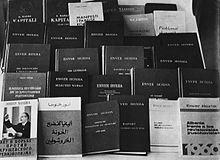
Hoxhaism (/ˈhɒdʒə.ɪzəm/ HOJ-ə-iz-əm) is a variant of anti-revisionist Marxism–Leninism that developed in the late 1970s due to a split in the anti-revisionist movement, appearing after the ideological dispute between the Chinese Communist Party and the Party of Labour of Albania in 1978. The ideology is named after Enver Hoxha, First Secretary of the Party of Labour from 1941 to 1985 and leader of Albania from 1944 to 1985.
The term Hoxhaism is rarely employed by the organizations which are associated with this trend, with Hoxhaists viewing Hoxha's theoretical contributions to Marxism as strictly an augmentation of anti-revisionism rather than a distinct ideology. Hoxhaists typically identify themselves with Marxism–Leninism or Stalinism.
Overview
| This section relies excessively on references to primary sources. Please improve this section by adding secondary or tertiary sources. (November 2022) (Learn how and when to remove this message) |
Hoxhaism demarcates itself by a strict defense of the legacy of Joseph Stalin, the organization of the Soviet Union under Stalinism, and fierce criticism of virtually all other communist groupings as revisionist—it defined currents such as Eurocommunism as anti-communist movements.
Critical of the United States, the Soviet Union, China, and Yugoslavia, Enver Hoxha labeled the latter three "social imperialist" and condemned the Warsaw Pact invasion of Czechoslovakia in 1968, before withdrawing Albania from the Warsaw Pact in response. Hoxhaism asserts the right of nations to pursue socialism by different paths, dictated by the conditions in those countries, although Hoxha personally held the view that Titoism was "anti-Marxist" in overall practice.
Following the fall of the People's Socialist Republic of Albania in 1991, many Hoxhaist parties grouped themselves around the International Conference of Marxist–Leninist Parties and Organizations (Unity & Struggle), an international conference founded in 1994, and its publication Unity and Struggle.
See also
- Enver Hoxha
- International Conference of Marxist–Leninist Parties and Organizations (Unity & Struggle)
- Juche
- Party of Labour of Albania
- People's Socialist Republic of Albania
- Sino-Albanian split
References
- Communism for Know-It-Alls. Filiquarian Publishing, LLC. 2008. p. 23.
- "Revolutionary Spirit: The Marxist-Leninist Guide to Leftist Factions". Revolutionary Spirit. 2010-02-27. Retrieved 2023-01-08.
- Pridham, Geoffrey (2000). The Dynamics of Democratization: A Comparative Approach. Bloomsbury Publishing. p. 70. ISBN 9780826450388.
- Hoxha, Enver (August 1979). "The Marxist-Leninist Movement and the World Crisis of Capitalism". Institute of Marxist-Leninist Studies at the Central Committee of the Party of Labour of Albania.
- Hoxha, Enver (1978). "I: The strategy of imperialism and modern revisionism". Imperialism and the Revolution. Tirana, Albania.
{{cite book}}: CS1 maint: location missing publisher (link) - "A Brief Guide to Hoxhaism". The Red Star Vanguard. 11 June 2011. Archived from the original on 25 May 2014. Retrieved 23 May 2014.
- Hoxha, Enver. "Enver Hoxha: Eurocommunism is Anticommunism". Archived from the original on 23 May 2014. Retrieved 23 May 2014.
- Hoxha, Enver (1960). "Reject the Revisionist Theses of the XX Congress of the Communist Party of the Soviet Union and the Anti-Marxist Stand of Krushchev's Group! Uphold Marxism-Leninism!". Naim Frasheri Publishing House.
- "Communist Declaration to the Workers of the World". www.revolutionarydemocracy.org. Retrieved 2023-01-24.
| Marxism–Leninism | |
|---|---|
| Concepts |
|
| Class system |
|
| Political system | |
| Variants |
|
| People |
|
| Theoretical works |
|
| History |
|
| By country |
|
| Organizations |
|
| Related topics |
|
| See also |
|
|
| |

